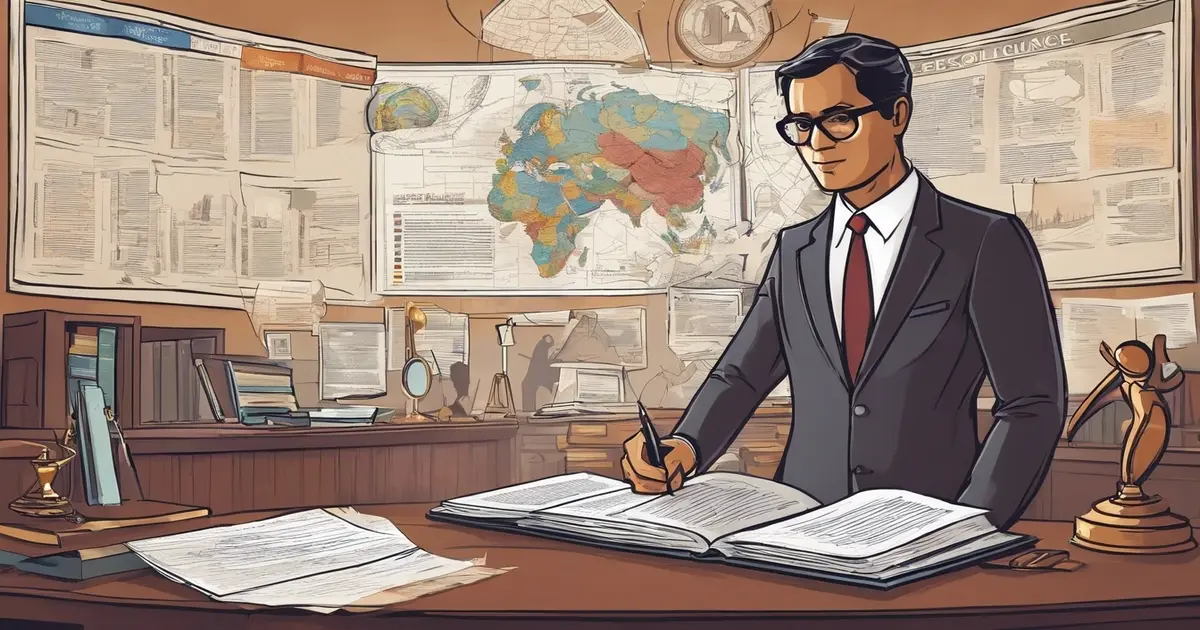Transactional Environmental Lawyer: Key Roles Explained
Have you ever wondered how businesses navigate the complex web of environmental laws without getting caught in legal snares? Enter the transactional environmental lawyer, a specialized legal eagle who ensures companies can conduct their operations within the framework of environmental regulations. These lawyers are not just about courtroom battles; they're strategists, negotiating deals and advising on compliance to prevent legal issues before they arise. With the planet's health becoming a central concern for industries worldwide, understanding the role of these legal professionals is more crucial than ever.
Whether you're a business owner, an aspiring lawyer, or simply curious about environmental law's impact on commerce, this exploration into what a transactional environmental lawyer does will shed light on their indispensable role in today's eco-conscious world.
Table Of Contents
Key Takeaways
- Transactional environmental lawyers specialize in navigating the complex interplay between business transactions and environmental regulations, ensuring compliance, and mitigating client risks.
- Key roles include advising on environmental aspects of corporate mergers, acquisitions, real estate deals, and project financing, emphasizing the importance of understanding legal and ecological issues.
- Success in this field requires unique skills, including strong analytical abilities, attention to detail, and knowledge of environmental science and law.
- Essential qualifications for aspiring transactional environmental lawyers include a law degree focusing on environmental law; certifications or additional training in related fields can be advantageous.
- These lawyers play a critical role in interpreting and applying environmental regulations to various transactions, making them invaluable in today’s increasingly eco-conscious business landscape.
- Career paths vary widely, from private practice in law firms to corporate counsel roles or positions within government agencies, offering a range of opportunities for those interested in this intersection of law and environmental stewardship.
Defining Transactional Environmental Law
Legal Navigation
Transactional environmental law focuses on guiding businesses through complex legal landscapes. Lawyers in this field work to ensure that companies comply with environmental regulations during transactions. They interpret laws and advise on how to proceed without violating ecological standards.
These legal experts play a critical role in business planning and strategy. They assess the environmental implications of business moves, analyze potential risks, and suggest ways to minimize them. Their work ensures businesses can achieve their goals while adhering to environmental laws.
Risk Mitigation
A key responsibility of transactional environmental lawyers is to reduce environmental risks in business deals. This is crucial in acquisitions, mergers, and property developments. They evaluate the environmental liabilities these transactions may entail.
They conduct thorough due diligence, which involves examining a property's past uses or the environmental practices of a company being acquired. Identifying potential issues early helps clients avoid costly mistakes and legal complications.
Proactive Approach
Unlike other branches of environmental law, which may focus on litigation after disputes arise, transactional environmental law adopts a proactive stance. It aims to resolve potential environmental liabilities before they escalate into disputes or litigation.
This approach saves time and resources and protects the businesses' reputation. It demonstrates a commitment to environmental stewardship and corporate responsibility. Businesses benefit from smoother transactions and more robust compliance records.

Roles and Tasks of These Lawyers
Due Diligence
Transactional environmental lawyers play a crucial role in conducting due diligence for their clients. They meticulously assess compliance with environmental regulations and pinpoint potential liabilities. This process is vital in business transactions, especially when properties or companies with significant ecological footprints are involved.
They scrutinize past and present operations to identify any contamination or non-compliance issues. Their findings can significantly influence negotiations, pricing, and the decision-making process. By identifying risks early on, they help clients make informed choices.
Risk Management
These legal professionals are instrumental in advising on risk allocations. They guide clients through the complexities of insurance coverage, indemnification, and risk-sharing arrangements. Their expertise ensures that businesses are adequately protected against potential environmental liabilities.
They work closely with deal teams in complex deals to structure agreements that minimize exposure to environmental risks. Their advice helps safeguard companies from unforeseen costs and legal challenges.
Regulatory Approvals
Obtaining necessary approvals and permits is another critical task for transactional environmental lawyers. Projects impacting zoning, wetlands, endangered species, and water use require careful navigation through regulatory frameworks.
They liaise with local, state, and federal agencies to ensure projects comply with all relevant laws. This often involves preparing detailed applications and advocating for their client's interests during approval. Their efforts ensure projects proceed without legal hurdles related to environmental concerns.
Key Skills for Success
Analytical Abilities
Transactional environmental lawyers must possess strong analytical skills. They evaluate ecological risks and ensure legal compliance. This skill set is vital for identifying potential legal issues before they escalate.
They dissect complex regulations and assess their impact on various market sectors. This precision helps them craft strategies that minimize risk while maximizing compliance.
Negotiation Skills
Negotiation stands as a cornerstone skill. Lawyers negotiate terms that align with environmental standards and client goals. They often find themselves at the negotiation table, advocating for favorable conditions in contracts and agreements.
Their communication ability ensures that all parties understand the environmental considerations at stake. This skill is crucial in securing deals that respect legal obligations and the environment.
Regulatory Knowledge
Staying informed about industry trends and regulatory changes is non-negotiable. These lawyers act as navigators through the ever-changing landscape of environmental law.
They provide clients with up-to-date advice, ensuring strategies remain compliant and competitive. Understanding policy shifts allows them to anticipate challenges and adapt strategies accordingly.
Required Qualifications
Educational Background
A law degree is the cornerstone for anyone aspiring to become a transactional environmental lawyer. This degree should ideally focus on environmental law or related fields such as environmental policy, management, or science. The curriculum must cover various topics, from regulatory frameworks to sustainable development principles.
Graduates often pursue further specialization through advanced degrees or certificates in specific areas, such as climate change law or natural resources management. These additional qualifications can significantly enhance a lawyer's understanding of the complex interplay between legal systems and environmental issues.
Professional Licenses
One must first pass the bar exam in their respective state or jurisdiction. This non-negotiable licensure is a baseline requirement for all lawyers, including those specializing in environmental matters.
Beyond the bar, transactional environmental lawyers might find value in obtaining certifications related to environmental management systems (EMS) or sustainability. Such credentials underscore their commitment to environmental stewardship and give them a competitive edge in the job market.
Associations Membership
Membership in professional associations plays a crucial role in a transactional environmental lawyer's career. Organizations like the American College of Real Estate Lawyers (ACREL) and the Air and Waste Management Association (AWMA) offer invaluable resources for networking, continuing education, and professional development.
These associations also facilitate discussions on recent legislation changes, emerging trends, and best practices in environmental law. They are instrumental for lawyers looking to stay abreast of new developments and maintain their relevance in an ever-evolving legal landscape.
Navigating Regulations and Transactions
Regulatory Landscapes
Transactional environmental lawyers excel in navigating complex regulatory landscapes. They ensure businesses comply with all relevant environmental laws during transactions. This expertise is crucial for firms acquiring or merging with other companies. Lawyers analyze local, state, and federal regulations to identify potential legal hurdles.
They conduct thorough environmental assessments. These include evaluating the target company's compliance history and potential liabilities. This due diligence is foundational in avoiding costly legal issues post-transaction.
Due Diligence
Transactional environmental lawyers shine in the due diligence phase. They meticulously examine all aspects of a company's operations related to the environment, including waste management practices, emissions, and use of hazardous materials.
Lawyers assess risks and advise on mitigation strategies. They work closely with firms to ensure that any acquisition or merger aligns with current environmental regulations. This process helps identify liabilities that could affect the transaction's value or lead to significant legal challenges.
Future Regulations
Understanding current laws is just one part of the equation. Transactional environmental lawyers also need to anticipate future regulatory changes. They advise clients on how upcoming legislation could impact their business operations.
This foresight allows firms to make informed decisions about long-term investments and projects. Lawyers guide clients through adapting business practices to stay ahead of regulatory shifts. This proactive approach ensures that companies comply with existing laws and are well-prepared for future changes.

Career Paths in Environmental Law
Private Practice
Environmental lawyers in private practice often represent clients on various environmental issues. They work with businesses, non-profits, and individuals to navigate the complex web of environmental regulations. This role requires a deep understanding of environmental law and the ability to apply it to diverse scenarios. Lawyers in this sector may also engage in litigation to defend their clients' ecological interests.
The private practice offers opportunities for specialization. Lawyers can focus on air and water quality, waste management, or renewable energy projects. This specialization allows them to become experts in niche areas and provide valuable services to their clients.
Corporate Departments
Lawyers within corporate legal departments play a crucial role in ensuring that companies comply with environmental laws. They advise on the legal aspects of environmental management and sustainability practices and help corporations avoid legal pitfalls by assessing risks associated with environmental regulations.
Working in a corporate setting allows lawyers to influence business strategies directly. They ensure that companies meet legal requirements and adopt practices that benefit the environment. This role is critical for companies looking to maintain or improve their public image regarding environmental stewardship.
Government Agencies
Environmental lawyers working for government agencies enforce laws designed to protect the environment. They review and approve permits, conduct investigations, and prosecute violators of environmental regulations. These roles are essential for implementing and enforcing policies to preserve natural resources.
Lawyers in government positions have unique opportunities to shape environmental policy. Through their work, they contribute to developing regulations that balance economic growth with environmental protection.
Specialization Opportunities
Transactional environmental lawyers can explore distinct paths based on their interests and expertise. Some may specialize in advising on green real estate developments or clean technology startups, while others might focus on regulatory compliance for industries such as manufacturing or agriculture.
Specializing allows lawyers to become highly skilled in particular transactions or sectors. This expertise makes them invaluable advisors to clients navigating the complexities of environmental law.
Career Advancement
Environmental law offers significant potential for career advancement. Lawyers can rise through the ranks in their organizations, becoming partners in law firms or senior counsel in corporations or government agencies.
Recognition from professional organizations and legal publications is another aspect of career growth. Achievements such as receiving awards or being featured in top lawyer lists highlight an attorney’s expertise and contributions to the field.
Choosing Your Path
Personal Interests
Understanding your interests is the first step toward a career in transactional environmental law. This field requires a passion for both legal intricacies and ecological conservation. Reflect on what drives you. Is it the desire to shape policies, protect natural resources, or work on renewable energy projects? Your motivation can guide your career trajectory.
Transactional environmental lawyers negotiate deals that have positive environmental impacts. They draft agreements, perform due diligence, and ensure compliance with environmental regulations. If these tasks excite you, this path might be your calling.
Skills Assessment
Evaluate your skills next. Success in this niche demands solid analytical abilities, attention to detail, and excellent communication skills. Are you good at problem-solving? Can you understand and interpret complex regulations? These are essential qualities for transactional environmental lawyers.
Consider also your ability to negotiate and persuade. You'll often need to advocate for sustainable practices in business transactions. Transactional environmental law could be a fitting career choice if you possess or are willing to develop these skills.
Gaining Experience
Start by seeking internships or clerkships in law firms specializing in environmental law or with organizations focused on conservation. These positions provide invaluable hands-on experience. They allow you to see the day-to-day work of environmental lawyers up close.
Entry-level positions in related fields can also be beneficial. They offer a glimpse into the broader context of environmental advocacy and regulation. Use these opportunities to build a network of professionals who can provide guidance and mentorship.
Continuous Learning
The field of transactional environmental law is ever-evolving. Stay informed about new laws, technologies, and trends in sustainability. Continuous learning is crucial for staying relevant and practical in your practice.
Attend workshops, seminars, and conferences focused on environmental law and policy. Join professional associations such as the Environmental Law Institute or the American Bar Association's Environment, Energy, and Resources Section. These groups offer resources for professional development and networking opportunities.
Final Remarks
Transactional environmental lawyers are crucial in navigating the complex interplay between business and environmental protection. Your journey into this field demands a blend of sharp legal insight, a deep understanding of environmental regulations, and a passion for sustainability. Whether you're eyeing a career that shapes policy, negotiates impactful deals, or ensures compliance with environmental laws, your path has opportunities to make significant contributions to the planet and the business world. The skills and qualifications discussed prepare you for the challenges ahead and position you as a critical player in driving positive environmental change through the lens of law.
Embarking on this career path allows you to be at the forefront of sustainable development. If you're ready to leverage your legal expertise for the greater good, consider diving deeper into transactional environmental law. What is your next step? Explore further education or seek out mentorship opportunities in this dynamic field. The planet and future generations will thank you for it.
Frequently Asked Questions
Related Post
Research and Academic Lawyer
Have you ever wondered how legal theories evolve or where groundbreaking court decisions stem from? Behind these critical developments are research and academic lawyers, unsung heroes in the legal realm.
Read MoreClimate Change Lawyer
In an era where climate change is not just a buzzword but a pressing global issue, the role of a climate change lawyer, serving as a legal fellow in environmental advocacy and addressing environmental issues alongside ecological advocates, has never been more critical.
Read MoreWildlife and Natural Resources Lawyer
Have you ever wondered who may stand at the forefront of protecting our planet's precious wildlife, timber, and natural resources?
Read MoreRegulatory Compliance Lawyer
Nearly 90% of businesses report that compliance with regulations, including regulatory issues and legal obligations enforced by regulatory agencies, is one of their top challenges.
Read MoreZoning and Land Use Lawyer
Navigating the complex web of regulations, including real estate law, zoning ordinances, restrictive covenants, and planning commissions, that dictate how land can be used often feels like an impossible challenge for property owners and developers.
Read MoreEnvironmental Lawyers
Environmental lawyers offering legal services and advocacy stand as unsung heroes, attorneys, and legal fellows in a world where the environment is constantly threatened.
Read More






